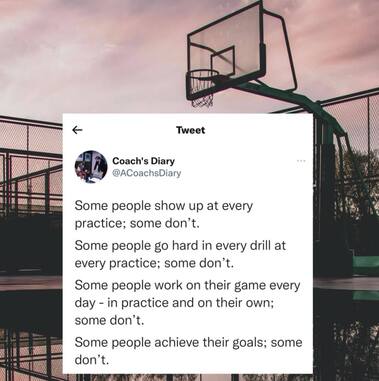Bridging Leadership Lessons from the Workplace and Those Experiences Shaping Today's Youth and Tomorrow's Leaders
 Facebook post from Coach's Diary Facebook post from Coach's Diary As a parent and coach, I have had a front row seat of the struggles and challenges that parents and young athletes experience as they transition into high school programs. Every year there are kids who think they should be playing but never do. Those promising, dominant athletes through youth ball or junior high that never touch the court or field for a high school, let alone a varsity game. Interestingly enough, the same thing happens on the jump to college athletics and then on to the professional level where competition, stress, mental toughness rises exponentially. Further, this is something you will see in the workplace. People with talent that never seem to fit in an organization. Intelligent go-getters that never seem to accomplish what is needed. In this post, I have identified some of the various complaints that I have heard over the years and summarized into 8 reasons that athletes don’t seem to make it to the next level. While many of these same items apply to the workplace, you are going to have to do a little work on your own to extract the correlation on how youth coaches either didn’t prepare you or the early growth spurt you had when you were 10 leads to someone not being successful on a marketing project to introduce the latest virtual reality gum chewing app. THEIR GAME Many times, the reality is that while a player was successful early on in his career, the reason they were successful may not translate to the next level. Many coaches have systems, and when kids are at their best in a free-flowing, one-on-one environment, they could struggle to learn the plays and contribute as part of the team. As you age, you will find these young men playing pick-up ball and they either didn’t play high school basketball or were simply average. Then you play against them, and your first question is what college did they play at and what was wrong with that high school coach? Also, they may not be good enough. Sorry, but somebody has to say it to you. FAILING TO GROW Everyone knows the kid with the mustache in 6th grade that leaves the parents of the opposing team asking if he drove the bus. But in reality, there are kids that mature early and dominate kids who are smaller, less developed and who are not as confident. People expect that they will continue to dominate, not realizing that they have stopped growing and no longer possess the superior size and athleticism. Some kids fail to keep growing their game. Due to their dominance in height or athleticism, they learn a style of game that gives them success. The taller kids learned to turn and shoot and probably were told not to dribble. They got rebounds because of their height, not their technique or drive. They still view themselves as that same player, but while 6’0” was tall in 7th grade and would put you in the post, in larger high schools you better learn to handle the ball and get a jump shot. Same with the athletic kid who uses it to beat the kids down the court and get to the basket. As other kids catch up, and their skills improve, the gap goes away and what kids relied on to help them be successful isn't enough, so they are left behind. YOUTH COACHES While I love the passionate coaches of youth basketball, many times they are more focused on winning the 4th grade tournament than they are in preparing them for high school. Scheming to manufacture points instead of growing their players. Not letting the big kid leave the paint. Running a pick and roll to their best player every time and creating one dimensional players. My focus has been Coach to Develop versus Coach to Win. If you develop the players, the wins will take care of themselves. DISTRACTIONS A lot of things change for kids as they get older. Other sports and hobbies are competing for their time. They develop romantic relationships that become their focus instead of their sport. For kids who are driven in the classroom, sports become the distraction to where they want to go in life. They develop a different friend base with different interests. While we like the multi-sport athletes, it can be extremely challenging to put in all the work that is required. Unlike when I had to walk uphill both ways to school, sports are no longer played just in the season. EVERY sport has off-season workouts and while they may not be mandatory, they are if you want to play. It can be too much. PARENTS I have written many times about the responsibilities of parents to provide the foundation of success. Teaching their kids how to challenge, think critically, and solve problems. In today’s world of instant response of social media, kids want to google everything and have it happen. They would rather watch a highlight real on Instagram instead of watching a game. Parents have facilitated this process. They too want their kid to be the next LeBron. We invited our high school Athletic Director to speak to our youth basketball feeder program. The main takeaway was that for parents, the situation will always be emotional because it is your child. Who you love more than life itself and are committed to protect them. Often, we have a difficult time stepping back and truly assessing our child and their skills. I have written before about those uncomfortable situations, and much of the issues with attitude in the player start at home with the parent. Many times, parents have high expectations and push their kids to be successful. Sometimes, the kids are simply not able to achieve the vision that the parents have cast. In other cases, the kids don’t share the vision but haven’t found their voice yet to say so and therefore are not behind the vision. ATTITUDE If there is an issue between a player and a coach, inevitably it will come back to attitude - real or perceived - but it is typically at the heart of the conflict. Excuse making IS an attitude problem because the player is failing to critically assess the situation and first look at themselves and what they can do to make the situation better. You have heard those kids talk about a coach not liking them, or the coach is an idiot, or they are playing the doctor's kid. Typically, their support structure, whether friends or family, are feeding into this line of thinking. Now they are in a vicious circle of being the victim and everything negative that happens adds to the stress. You can also have a good kid with an attitude that is not compatible. As a coach, you are looking for the kids who always work hard. The kids who are driven and put in the extra time to be successful. The kids who not only want it, but also are actively trying to get it. I dealt with that firsthand as my oldest son had a talent and feel for the game of football, but his laid-back attitude was hard for the coach to take. When he finally had an opportunity to play, he put up huge numbers including some single game passing records. But the coach couldn’t get past the fact that he wasn’t what he expected in a quarterback nor was he what he wanted. Sadly, I understood why, but it doesn’t mean I agreed or always accepted it graciously. BURN OUT See Youth Coaches and Parents. Yep, sorry, but you are really the ones to blame here. MERITOCRACY Sports is the ultimate meritocracy. Coaches are there to win games while developing kids. Coaches are not trying to lose on purpose and play the worst athletes. If you have an opportunity to help the team, they are going to find a way to play you. If you are not playing, then you probably need to do a better job of self-assessment. Sometimes, kids are simply not ready to play at the next level. They look the part. They have a history of being that player. But for whatever reason, typically a confidence or mental toughness is not there that will help them push through to compete. I had a coach remind me the other day that my youngest is only 14 years old. Expecting him to have the confidence of an 18-year-old all the time is probably not fair and I’m doing a disservice to his development. The team could be stacked, and the player cannot separate themself enough to get their shot. Many times, there is a numbers game in a program where you are trying to make sure you have a great program and not just a single year of success. A coach needs to keep kids engaged and ready to fill the role that is required of them, so they balance out the short term and long-term goals. Does all this sound familiar? And yes, there are cases where the coach isn't qualified. They can make mistakes and overlook kids. It definitely happens. But my focus is on the things that you and your child can control. Step back, recognize that you are emotionally attached to the situation, and logically look at the facts. If you take the time, take the breath, many times you can clearly assess the situation and find ways to see that there is plenty of growth in all areas that can allow your child to be successful Beyond Today.
1 Comment
|
AuthorTom Brown - a husband and a father who is simply trying to make a difference. Using my experience as a Manufacturing Executive to connect leadership from the boardroom to the hardwood to help teams grow and develop to make a difference in the lives of others. Archives
May 2024
Categories |
Proudly powered by Weebly

 RSS Feed
RSS Feed

